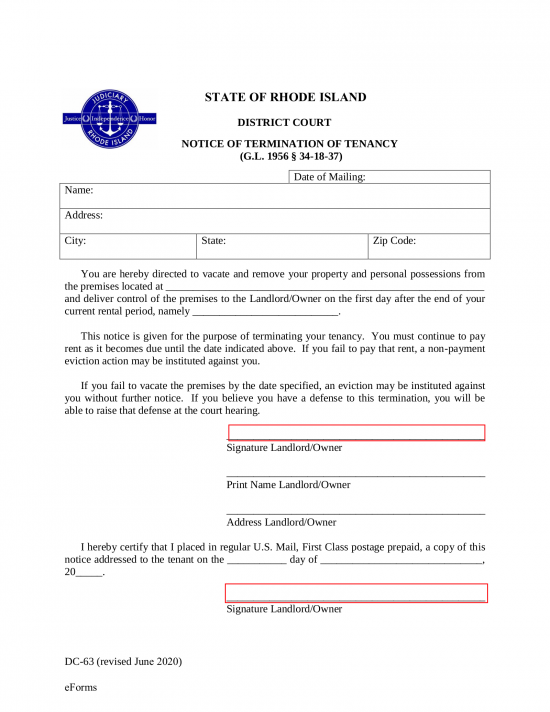By Type (4)
 5-Day Notice to Quit (Non-Payment of Rent) – This type of notice can be issued if rent is late by 15 days or more. 5-Day Notice to Quit (Non-Payment of Rent) – This type of notice can be issued if rent is late by 15 days or more.
Download: PDF |
 20-Day Notice to Quit (Non-Compliance) – For use when a tenant is violating a term of the lease other than timely payment of rent. If the same violation has already been committed in the last six months, this notice can be modified to be incurable and the tenant will be forced to vacate the premises. 20-Day Notice to Quit (Non-Compliance) – For use when a tenant is violating a term of the lease other than timely payment of rent. If the same violation has already been committed in the last six months, this notice can be modified to be incurable and the tenant will be forced to vacate the premises.
Download: PDF |
 24-Hour Notice to Quit (Illegal Activity) – This form is to inform the tenant of imminent eviction proceedings if they do not leave the premises immediately due to illegal activity. No notice is legally required under these circumstances. 24-Hour Notice to Quit (Illegal Activity) – This form is to inform the tenant of imminent eviction proceedings if they do not leave the premises immediately due to illegal activity. No notice is legally required under these circumstances.
Download: PDF |
 30-Day Notice to Quit (Month-to-Month Tenancy) – For use when a landlord seeks to inform a tenant that they do not intend to renew a month-to-month tenancy. 30-Day Notice to Quit (Month-to-Month Tenancy) – For use when a landlord seeks to inform a tenant that they do not intend to renew a month-to-month tenancy.
Download: PDF |
Court Forms
Complaint for Eviction for Non-Payment of Rent (DC-54) – This complaint form is filed by the landlord in order to evict a tenant for failing to pay rent.
Complaint for Eviction for Reason Other than Non-Payment of Rent (DC-38) – Landlords may file this complaint form to evict a tenant for any reason other than the non-payment of rent.
Answer Defendant/Tenant (DC-53) – Completed by the tenant after receiving notification of an eviction action filed against them. This form allows the tenant to state the reasons why they should be permitted to retain their tenancy.
How to Evict a Tenant (6 steps)
1. Provide Notice to Tenant
Before a landlord may seek a court’s assistance to evict a tenant, a landlord must provide notice to inform them that they will face eviction if the issue is not resolved. It is important that the landlord keep a copy of the notice served and have some evidence that it was in fact served. The possible forms are as follows:
2. File a Complaint with Local Court
Once the landlord has waited the requisite waiting period, then they can file a complaint with the Local District Court. There are two types of complaints depending on the reason for eviction. For non-payment, use a Complaint for Eviction for Non-Payment. For other types of violations, use a Complaint for Eviction for Other than Non-Payment. An $80 filing fee applies.[8]

